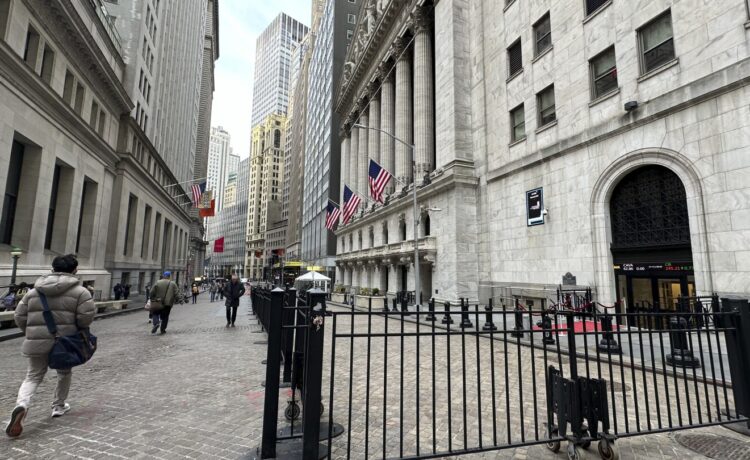NEW YORK (AP) — Wall Street is stumbling to close out its latest losing week.
U.S. stocks fell after oil prices briefly surged overnight on worries about fighting in the Middle East.
The S&P 500 was 0.7% lower in afternoon trading and on track for its third straight losing week. That would be its longest such streak since September, before it broke out into a record-setting romp.
The Dow Jones Industrial Average was up 125 points, or 0.3%, as of 12:46 p.m. Eastern time, and the Nasdaq composite was down 1.6%.
In the oil market, a barrel of Brent crude was back to $87.20, up 0.1%, after briefly leaping above $90 overnight. Iranian troops fired air defenses at a major air base and a nuclear site during an apparent Israeli drone attack, raising worries in the market. But crude prices pared their big gains as traders questioned how Iran would respond.
Wall Street is limping toward its longest weekly losing streak since September. AP business correspondent Damian Troise has more.
On Wall Street, Netflix sank 8.9% despite reporting stronger profits for the latest quarter than expected. Analysts called it a mostly solid performance, but the streaming giant disappointed some investors by saying it will stop giving updates on its subscriber numbers every three months, beginning next year.
Procter & Gamble also weighed on the market after the consumer-products giant reported lower revenue for its latest quarter than analysts expected. Sales trends for its baby care products weakened following hikes to their prices and sank for its super-premium SK-II skincare brand, diluting gains made elsewhere.
The company behind Pampers, Oral-B and other brands reported stronger profit for its fiscal third quarter than analysts expected and raised its forecast for earnings in the fiscal year. But it did not raise its forecast for sales. Its stock slipped 0.4%
Helping to limit the market’s losses was American Express, which rose 5.1%. It reported stronger profit for the latest quarter than analysts expected. Fifth Third Bancorp rose 6.1% after it likewise topped expectations.
The pressure is even higher than usual on companies to meet forecasts for their quarterly results. That’s because the other lever that helps set stock prices, interest rates, looks unlikely to offer much help in the near term.
Top Fed officials said recently that they could hold interest rates at their high level for a while. That’s a letdown for traders after the Fed had signaled earlier that three cuts to interest rates could be possible this year.
Lower rates would juice the economy and financial markets, and they earlier appeared to be on the horizon after inflation cooled sharply last year. But a string of reports this year showing inflation has remained hotter than expected has raised worries about stalled progress.
Fed officials are adamant that they want to see additional proof inflation is heading down toward their 2% target before lowering the Fed’s main interest rate, which is at its highest level since 2001. High rates hurt prices for investments and raise the risk of a recession.
Traders are now largely forecasting just one or two cuts to rates this year, according to data from CME Group, down from expectations for six or more at the start of the year. A growing number are expecting zero cuts this year.
But Brian Jacobsen, chief economist at Annex Wealth Management, expects inflation to moderate as U.S. households that have become “hypersensitive to price hikes” by businesses begin slowing their spending.
“The giant sucking sound of optimism (escaping) from the market is due to the Fed’s lack of foresight and irrational focus on where inflation has been instead of where it’s going,” he said.
In the bond market, the yield on the 10-year Treasury eased to 4.62% from 4.64% late Thursday to trim its gain for the week. It had been down much more overnight, when worries were spiking about a potentially broadening war in the Middle East, but it pared its losses as the day progressed.
In markets abroad, stock indexes were modestly lower in Europe after falling more sharply in Asia.
Japan’s Nikkei 225 lost 2.7%. A report said the country’s inflation rate slowed in March, and investors are waiting for the Bank of Japan’s next move after it raised its benchmark interest rate last month for the first time in 17 years.
___
AP Writers Matt Ott and Zimo Zhong contributed.












